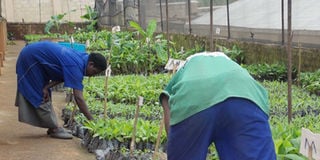Tissue Culture: Best option for getting disease- and pest-free plant material

Workers care for plantlets in a nursery before being transferred to the field. Photo by Michael J. Ssali.
What you need to know:
How does a farmer get good results from the seed he or she has planted while facing the threat of pests and diseases? The option of tissue culture to propagate seed provides the answer.
A prudent farmer setting out to grow any crop will normally make effort to get good seed. Most agriculturists agree that the choice of the right seed increases yields by 30 per cent.
Failure to access good planting material has contributed greatly to the overall declining agricultural production.
No guarantee
Some farmers even plant diseased seedlings while others plant seedlings infested with pests. There are others who merely take seed of a good looking crop in the hope that when it is planted, the resulting crop will be as good.
Often they end up disappointed because there is no guarantee that the plant will be similar to the plant from which the seed was got. This is more or less what happens when a man begets a son. Since some of the son’s physical or behavioural characteristics are from his mother he can never be really identical to his father.A way to get an identical product is by tissue culture—a process by which seedlings are developed in a laboratory from plant cells.
Scientists can turn each individual cell into a complete plant. Therefore, it is possible to get identical plantlets from just a part of a plant such as coffee or banana.
In Uganda, it has been practiced in agricultural research institutions. However , unknown to most farmers is that Uganda, also has perhaps the biggest private tissue culture laboratory in East and Central Africa—Agro-Genetic Technologies (AGT Laboratories), located in Buloba, Mityana District.
Unifomity in products
The laboratory, which has the capacity to produce up to 10 million plantlets every year, also makes plantlets of different crops like pineapples, tea, cassava, yam among others.
Erostus Nsubuga, the proprietor, said he is considering to set up another laboratory in Kigali, Rwanda, soon because of the response of the market there. “Some farmer organisations and individual farmers have placed orders for plantlets.”
He added: “But if all our farmers understood the importance of planting clean and disease-free seedlings, our overall agricultural production would greatly improve.
There is also the need for uniformity of our products so that we are in a position, for example, to maintain a standard taste of mangoes, bananas, pineapples by growing only desirable lines whose plantlets can be produced through tissue culture or cloning.”
He observed that due to commercialisation, the cultivation of traditional banana lines—whose taste is otherwise very good—is neglected because they are not large enough to attract good income in our markets.
Nsubuga said most orders placed so far are for the large type of bananas, mainly Mpologoma and Kibuzi. The good news for coffee farmers is that AGT was contracted by the Uganda Coffee Development Authority to produce two million wilt-resistant plantlets. “We expect them to be ready for passing on to the farmers by the end of this year or early next year.”
Good care
Nsubuga, who is an agricultural research scientist by training and a former telecom executive, said he has acquired more land near the laboratory where he is going to build an agricultural academy.
“It will serve as a demonstration garden and a training institution for farmers who buy our plantlets in good agronomical practices,” he said.
“For some farmers, the training will involve insight into what actually takes place in the laboratory while for others, the training will be about how to nurture the plantlets once they are planted in the field.”
He believes that after planting the right plantlets the farmer must take good care of the crop to come up with the best results.
So far, AGT has established nurseries and demonstration gardens in various districts and farmers who purchase the plantlets are encouraged to visit the demonstration gardens to see how the plantlets are expected to perform with good agronomical practices.




